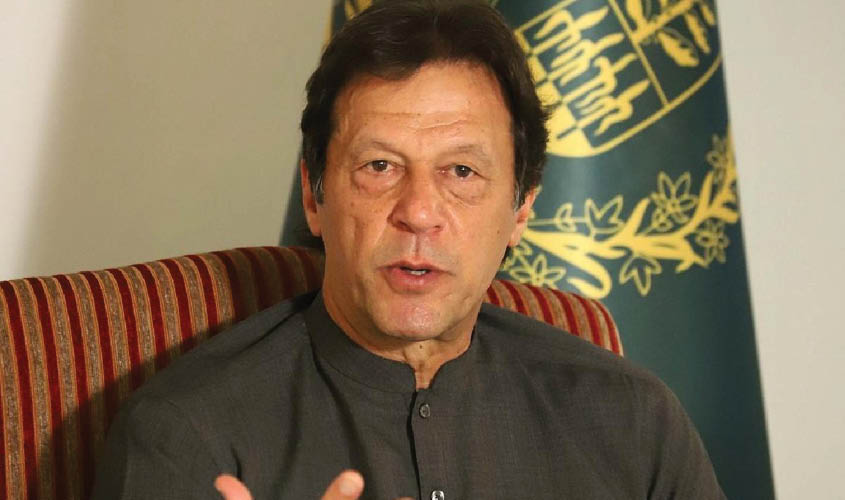Recognising that Pakistan was on a verge of disintegration, Prime Minister Imran Khan has desperately been trying to assume the leadership of extremist elements both in his country as well as in Afghanistan. In a rapidly evolving situation, Imran apparently is striving to be a leader who could emerge as an iconic figure for young fundamentalists seeking to wage jihad against non-Islamic countries. The Oxford-educated suave former cricketer has an international profile, which sets him apart from others in the Islamic world who could be viewed as inspirational leaders.
Imran has been targeting India over the Kashmir issue and has been consistently attempting to internationalise the matter. He is once again expected to make a major pitch on the subject during next week’s United Nations General Assembly meeting. The flamboyant politician, who had become a role model for his country’s youth, after he led his team to victory in the 1992 Cricket World Cup, is aware that he has not been able to provide any solution to Pakistan’s innumerable problems. The province of Punjab, in particular, is not favourably inclined towards him and considers the imprisoned Nawaz Sharif as its primary leader.
Imran is conscious of the fact that the Punjabi stranglehold in Pakistan could thwart many of his plans, and therefore if he has to succeed, he will have to reinvent himself. Being a Pathan, who shares common ground with a large population in Afghanistan, Imran is possibly looking at a scenario that may develop if Pakistan gets balkanised, with unrest continuing in virtually all its regions. His efforts would be to take over the leadership of Taliban, which exists on both sides of the border, in order to enhance his international importance.
Over the years, Pakistan has been ruled by military dictators, and no civilian has lasted for a sizable term in office. The Army calls the shots and can overthrow popular governments which are heavily dependent on the uniformed forces for assistance. The current Pakistan Army Chief, General Qamar Javed Bajwa, is a very accomplished officer, who has had a distinguished career, but being
Imran realises that Lahore, Rawalpindi and Islamabad are Punjabi dominated areas and for him to do something bigger, he would have to perhaps provide renewed relevance to Peshawar from where many Pathans hail. Peshawar and its adjoining regions were also the training grounds for the Taliban, which fought the Soviet forces that occupied Afghanistan. A few months ago, top Afghan leaders, including the notorious Gulbuddin Hekmatyar, were hosted by Pakistan in Peshawar.
The meet was an oblique way of projecting Imran as the most appropriate person who could receive the endorsement of the warlords in order to take forward the peace process which had begun in Doha. It is another matter that earlier this month the US-Taliban talks suffered a setback when President Donald Trump unilaterally declared that Washington would not tolerate any digressions from the dialogue framework which included suspension of any attacks on US troops in that country.
Imran has been positioning himself extremely carefully to be the face of the Pathans and consequently the Taliban. There are a number of extremist leaders who have been in the news for their barbaric and terror related activities. Among them are Abu Bakr Al Baghdadi, Ayman al Zawahiri and Hekmatyar who runs an outfit called Hezb-e-Islami, which is inspired by the Muslim Brotherhood of Egypt. Osama Bin Laden’s son, Hamza, who was coming up gradually, was recently killed, a fact which was confirmed by Washington.
There are well regarded leaders such as the Saudi Prince, Mohammad bin Salman Al Saud and the UAE Prime Minister Mohammad bin Rashid Al Maktoum, who command respect amongst members of their own community. However, in this context, Imran Khan perhaps is the only one who can ignite the romantic concept of revolution that possibly could attract educated Muslims, many of whom have been found involved in nefarious activities the world over. He can market ideas with a maverick spin.
His latest strategy of laying emphasis on the Kashmir issue is to elicit support from across the Islamic world. He is going all out in making the matter a Muslim versus non-Muslim one. Imran has not cut much ice since Western countries have declined to buy his line and so far as superpowers go, China is the only one which appears to be playing to his tune.
The Pakistan PM is seeking to send signals that with Hindu fundamentalists taking over the reins of power in neighbouring India, the minorities were no longer safe. He of course, is overlooking the record of his own country where unlike India, the minorities are treated like second class citizens. Imran is engaged in a dangerous game at the end of which he wishes to be the champion of Islamic extremists. His prescription to them is that the only way to counter Hindu fundamentalists was to have Islamic fundamentalists accepting him as their leader.
This is both a warning and challenge to New Delhi, which perhaps, also would find it much easier to deal with Prime Minister Imran Khan instead of Imran Khan Niazi as a Taliban leader. Between us.

